William Morris Moore (1813-1841)
Having written an article for last year’s Bulletin[1] on Chartist activities in the area, I thought it appropriate that a closer study should be made of the chief Tewkesbury Chartist, William Morris Moore.
Moore was the son of William and Elizabeth Moore, baptised on 11 July 1813 at Hathern, Leicestershire,[2] a village approximately three miles north-west of Loughborough. The occupation of his father is not recorded in the baptism record. Nevertheless, we know he was later a stockinger, as was William Morris Moore himself. Hathern was a centre for silk-stocking making and it was there in 1808 that John Heathcoat developed his ‘bobbinet’ machine for making lace.
From speeches Moore made during his Chartist activities we know that he spent some time as a youth with his parents in France and Belgium. Bennett[3] corroborates this and tells us that he was there in 1830 during the ‘Three Glorious Days’. This was an insurrection that brought Louis-Philippe to the throne of France replacing Charles X. It followed three days of fighting (27-29 July 1830) and inaugurated a liberal constitutional monarchy known as the ‘July Monarchy’.
Perhaps this event taught the seventeen-year-old Moore that the people could change their government by direct action. Bennett certainly thought so and wrote that “the fevered notions of ‘liberty and equality,’ which he had imbibed in France, during those ‘Three Glorious Days’, sowed in his mind the seeds of the revolutionary principles of Chartism”.
to Expand
We know that a successful Chartist meeting was held in Tewkesbury on 12 March 1839 when a leading Chartist, Henry Vincent, spoke.[4] At this meeting it is highly probable that Moore was elected secretary of the newly formed Tewkesbury Working Men’s Association.
Surprisingly, after Frost had spoken, ‘three groans’ were proposed and carried for the Cheltenham Free Press, alias ‘The Twaddler’. This was because of some mild criticism of the Chartists that had appeared in that newspaper. The groans were given, immediately followed by three groans for the newspaper’s publisher, Samuel Harper. Yet the radical Free Press was the only organ that gave full coverage to local Chartist activities and was on the whole supportive. This is indicative of the siege-mentality of the Chartists.
Their ‘groans’ would perhaps have been better employed on a correspondent of the Liberal-leaning Gloucester Journal, whose report of a meeting on the bowling green of the Golden Hart Inn in Stroud, published on 16 March 1839, illustrates the vituperation that the Chartists engendered. The chief speakers were the Chartist leaders, Henry Vincent and William Burns.
On Saturday evening last was exhibited the most contemptible mountebank[6] scene that ever disgraced the town of Stroud … Burns’s appearance was suitable to his purpose, he looked like a sturdy determined butcher … Vincent, the hungry state tinker – the paid mountebank demonstrator – slunk forward like a cunning, ferocious, scalping savage, or rather like a beast of prey thirsting for blood. – The institutions which he could not overturn, he covered with filth, and polluted with venom the principles which he could not destroy … The people stared with wonder, as they would at a learned fortune-telling pig … A more vicious, impudent, monstrous attempt to delude the people, and to hurry them on to self-destruction, never suggested itself to the most fiend-like brain.
[Photograph by author 2010]
to Expand
This was, no doubt, Eliza Hale of Tewkesbury, secretary of the Tewkesbury Female Radical Association. She was active in the local Chartist movement and chaired a meeting in July of 500 women in Cheltenham that was addressed by Henry Vincent. Although the Chartists did not directly campaign for female suffrage many women attended meetings, sometimes forming the majority in the crowds.
On 12 August 1839, along with others, Moore addressed a meeting of about 1,000 at Winchcombe.[8] Some 550 people had marched from Cheltenham with banners proclaiming their interest in several issues: 'The Voice of the People', 'Cheltenham Female Democratic Association', 'Liberty of the Press', 'No Military Flogging', 'No Impressment', 'Radical Reform and Liberty of Conscience'. This is indicative of Chartism being a movement not confined solely to the Charter. They were met by Winchcombe Chartists with a banner inscribed 'Welcome'. They all marched through the town to a field at nearby Gretton, owned by John Capel. The meeting commenced with a song The Triumph of Freedom. At this point the local parson, Rev. Harvey, appeared on horseback and warned the chairman of the meeting, Mr. Banfield jnr., that he would be held responsible for any sedition spoken there. Moore answered, hoping that he would lay any blame on him if sedition was spoken and invited Harvey to stay and listen – he declined. Along with Moore, another man from Tewkesbury, reportedly named Bease (perhaps Samuel Pearse) spoke, addressing his audience as “brother slaves”. Moore concluded his speech with the words “Agitate –Agitate – Agitate, and I will never cease doing so till the Charter is the law of the land.” This meeting was criticised in the Cheltenham Chronicle as being a meeting of “motley and dissolute groups … the usual violent addresses were delivered”. In response 'A friend To Fair Play' wrote to the Cheltenham Free Press[9] saying that “The speech of that worthy young man Mr Moore, of Tewkesbury, inculcated better Christianity and morality than many of the clergymen of the Established Church preach, whose humble slave the Editor of the Chronicle is.” (A reference to the influence of Cheltenham’s Rev. Francis Close[10].)
At about this time it is reported that William Morris Moore had taken out a ‘Licence to Preach’ as a Methodist. This was an official authorisation for a person to preach the Gospel. It was not unusual for religious non-conformists (particularly Methodists) to support Chartism: Congregational Minister Ben Parsons at Ebley, near Stroud, spoke in favour of the Charter; the militant national Chartist leader Joseph Rayner Stephens was a Methodist Minister (at one time in Cheltenham). Also in Cheltenham for a period was the Charter-supporting Unitarian Minister, Henry Solly. Four days after the Winchcombe meeting Chartists carried out a ‘sit-in’ at St. Mary’s Church Cheltenham. After this action a crowd of around 2,000 heard Moore speak in a field in London Road. He took his text from Jeremiah 1:17–19 comparing the English people with the plight of the Israelites: “it was always the case that the afflictions that were brought upon them, were from sins committed by their kings or priests, and never for sins committed by the common people”. He carefully added that no person should go away with the impression that in speaking against kings he was speaking against the sovereign of this country as “he would not say anything seditious”. He went on to criticise the Rural Constabulary Act that proposed the setting up of county police-forces, likening it to the “French spy system”. He attacked both Tories and Whigs, the Poor Law, and described the Corn Laws as “damnable”. He asked The Almighty “to open the eyes of the rulers of the land, to the danger of anarchy and convulsion which threatened them if they did not administer justice to the poor, and remove the misery and suffering of the people”.[11] He concluded his speech by urging his listeners “to obey the laws of the land, while they are the laws, but to examine them publicly and express their opinion of them”: (characteristic of him to discourage law-breaking). The hymn Praise God From Whom All Blessings Flow was sung and the crowd quietly dispersed.
The sermon that Moore preached at London Road appears to have prompted Rev. Francis Close to make derogatory comments concerning its content and the character of the preacher. Moore answered in a letter published in the Cheltenham Free Press on 7 September 1839.
To The Rev. Francis Close
Cheltenham, Sept 2, 1839.
Rev. Sir, – I understand that in the course of a discussion which took place between you and Mr. William Milsom[12] a few days ago you had the monstrous audacity to say that I preached blasphemy in my sermon on the London-road, that I was a drunken, idle, and dissolute fellow, and that I was turned out of the Tewkesbury Tee-total Society for my habits of drunkenness … I now demand of you a proof of the truth of these different charges … though I am comparatively illiterate, am a member of the Working classes, and have not the facilities of obtaining knowledge which you have, yet, if you like, I will meet you on the platform of any public meeting you may think proper to call for the purpose, and I will there prove the rationality and Biblical character of those principles, and you, if you can, shall disprove the same. I have the honor [sic] to be, very Rev. Sir, your Fellow-citizen.
William Morris Moore,
Jeynes-row, Tewkesbury
Another repercussion of the Chartists’ action that weekend was that on the following Monday, John Haines, a framework knitter of Tewkesbury, appeared before the Cheltenham Magistrates. He had attended the St. Mary’s protest and handed out hymn sheets at the London Road sermon. He was charged with insulting a Col. Smith and another gentleman, obstructing the High Street by preaching a sermon, and being drunk. “Are you in the habit of preaching Sir?” asked one of the magistrates. “Preaching, Sir, did you say; I don’t preach generally; I am not in the habit of preaching, except on elevated occasions, when I get a little drop too much, which was the case on the present occasion.” Fined 5s. [25p] with costs.[13]
On the afternoon of Sunday 8 September 1839 William Morris Moore preached to a large crowd opposite the Old Abbey Field in Winchcombe. He took his text from Proverbs 31:9 “Open thy mouth, judge righteously, plead the cause of the poor and needy”. He described the wretchedness prevalent in England, blaming it on bad legislation. He stated that it was the duty of kings, queens, rulers and religious ministers to obey the injunction of his text, and denounced in strong terms all those who refused to do so.[15]
to Expand
He ridiculed the bills posted throughout the town that cautioned the people not to attend the meeting and wondered why special constables were necessary to hear “such a great long-legged giant as myself! Oh Dear! Oh Dear!” He attributed the lack of rights for working people to two main causes. Firstly, dissension among the working classes in that many of them supported the Whigs or Tories instead of supporting their own party. Secondly, the Clergy of all denominations who told them that, to be involved in politics, was to lose their religion. He thought this inconsistent, in that by saying this, they themselves were mixing religion with politics. Not everyone agreed as there was some throwing of apples and stones.
He arranged another public meeting there for the following day, which commenced at 6.30 pm in heavy rain. Some working men in the audience disrupted the meeting and fighting broke out. After a short adjournment to the local Working Men’s Association rooms the open-air meeting recommenced with Moore preaching a sermon without further disturbance. No doubt, as a precaution, the public houses were ordered to be closed at 10 o’clock.[17]
An indication of problems with Moore’s health becomes apparent when he cancelled a sermon planned for 21 September at Leckhampton due to a “severe indisposition”. He instead managed to speak for a short time at Green Lane, Charlton, to a small audience taking Isaiah 42:22–23 as his text: “But this is a people robbed and spoiled, they are all of them snared in holes, and they are hid in prison houses”.[18]On 29 September 1839 William Morris Moore was back in Winchcombe addressing a large crowd.[19] He began by warning the people that he had heard that attempts would be made to disrupt the meeting. He stated that his Licence to Preach gave him as much legal authority to preach “as your parish parson has for preaching in the pulpit of your parish church”. He cautioned would-be hecklers that he would report them to the magistrates! In the event he was not interrupted. He then proceeded to take as his text Isaiah 10:1–2 “Woe unto them that decree unrighteous decrees … turn aside the needy from judgement … take away the right from the poor”.He, of course, drew parallels with their present rulers. He even went as far as saying that all those in authority, “kings, queens, princes, lords, dukes, legislators and administrators, but especially Christian ministers [who refuse to give justice to the poor] I point them all, without exception, I say, I point them all to hell as their future destiny”. For good measure he also attacked the philosophy of Malthus.[20]
[Illustration: Plough Hotel, Cheltenham in 1826 (now the Regent Arcade entrance - copyright Cheltenham Museum & Art Gallery] [*For an article on Gaskell, see Derek Benson, 'William Penn Gaskell, 1808-1882', Cheltenham Local History Society, Journal 28 (2012)]
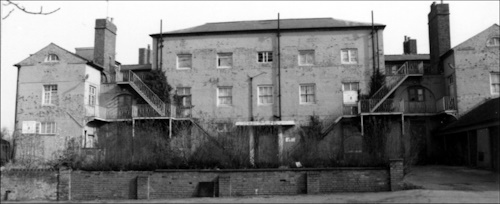
At this meeting Moore intimated that he would pay another visit to the neighbourhood. But he did not; the last reported event that he attended was a Cheltenham Chartist tea-party later in the month.[22]
His final days in the Tewkesbury Workhouse were those of a terminally ill, god-fearing man, who perhaps thought (and was no doubt told) that God was not a Chartist and that his soul was in peril. His deathbed recantation (if authentic) should be viewed in that light. William Morris Moore often quoted from Jeremiah 1:17–19 which contains the words “be not dismayed at their faces, lest I confound thee before them”. As he languished in Tewkesbury’s ‘Bastille’,[24] dismayed and confounded he very likely was.
[Tewkesbury Workhouse when Holm Hospital - photograph by Kathleen Ross 1986]
POSTSCRIPT:
To give some idea of the concern felt by local authorities during the Chartist agitation, the following letters from the Town Clerk of Tewkesbury are illuminating: [National Archives HO40-42]July 29th 1839
My Lord
The magistrates of the Borough have had information that the chartists in the Town & neighbourhood are very numerous, and are actively engaged in organising themselves, and it is believed are generally arming. The respectable inhabitants are consequently much alarmed, the Town and district being in a very unprepared state for meeting a sudden outbreak, as there are no troops within many miles, and no Yeomanry enrolled in this part of the county. Under these circumstances, I am instructed by the magistrates assembled at a meeting held this day to aquaint your Lordship with our situation, are to request that a detachment of Military may be stationed in this Town or its vicinity for its protection. Your Lordship is doubtless aware that the population here is almost entirely of the operative class, so that a constabulary force to be depended upon cannot be so conveniently organised as in many other places – nevertheless there are three Banks in the Town (mainly supported by the agricultural Interest in the neighbourhood) in which much property is at stake. It may be right I should add that situated as we are on the high road from Birmingham to Bristol our operatives are in constant communication with travelling emissaries from the former place. Your Lordship may probably have heard that there was an outbreak here in October 1831 which was only quelled by the 14th Dragoons then stationed at Gloucester, and the recollection of the determined character of the mob on that occasion and the necessity which existed for calling in the military, would it is feared have a paralysing effect upon an unsupported constabulary force in case of another disturbance. There are also at this time large bodies of railway Labourers at work in the immediate neighbourhood whose presence is an increasing source of alarm to the well disposed.
I have the honor to be
My Lord
Your Lordship’s very obedient servt.
Joshua Thomas
Town ClerkMy Lord
I am directed by the Magistrates of this Borough to transmit to your Lordship the copy of a letter addressed by their direction to the Secretary of State, and of the reply received thereto, in order that your Lordship may be made acquainted with the present state of the Borough. Great anxiety is felt some measures should be adopted for the protection of the Town, especially as it is generally understood, that large numbers of the operatives will not work after the 12th August the Magistrates direct me to express to your Lordship their hope, that in any arrangements that may be thought necessary to be made for the defence of the County generally, this District may receive your Lordships particular attention.
It has been suggested that a Troop of Volunteer Infantry might be easily raised here. Would your Lordship be so obliging as to state, whether, if such a Troop were raised, arrangements could be made for their being properly trained and whether any and what arms would be granted by Government.
The Upton Troop of Worcestershire Yeomanry Cavalry have recently been on duty at Birmingham. They are now returned having been replaced by the Evesham Troop. It has been suggested that your Lordship might probably be able to procure an order to be issued for their holding themselves in readiness to march to this Borough in case of a disturbance; and the Magistrates direct me to make known this suggestion known to your Lordship.
I have the honor to be
My Lord
Your Lordship’s very obedient servt.
Joshua Thomas
Town Clerk
To:
The Right Hon Lord Segrave
Her Majesty’s Lieutenant
References:
- Derek Benson, ‘Chartism in Tewkesbury and District’, THS Bulletin 19, 2010.
- Leicestershire Record Office, Hathern parish register DE731/3.
- Bennett, Tewkesbury Yearly Register & Magazine for 1841. James Bennett (1785-1856) bookseller, Freeman and historian of Tewkesbury.
- loucester Journal 16 Mar 1839.
- Cheltenham Free Press 8 Jun 1839.
- mountebank = quack doctor; market-place entertainer; charlatan.
- Woodard Database, Linnell: Tewkesbury Pubs.
- Cheltenham Free Press 17 Aug 1839; Cheltenham Examiner 14 Aug 1839.
- Cheltenham Free Press 24 Aug 1839.
- Rev. Francis Close (1797-1882), later Dean Close of Carlisle (Dean Close School, Cheltenham is named after him).
- Cheltenham Free Press 24 Aug 1839; D. Benson, ‘Chartism in Tewkesbury and District’, THS Bulletin 19, 2010.
- William Milsom of Cheltenham, National Chartist Association Branch Secretary.
- Gloucester Chronicle 24 Aug 1839.
- Cheltenham Free Press 14 Sep 1839.
- Cheltenham Free Press 14 Sep 1839.
- Northern Star 21 Sep 1839; Cheltenham Free Press 14 Sep 1839; The Charter 22 Sep 1839.
- Cheltenham Free Press 21 Sep 1839.
- Cheltenham Free Press 28 Sep 1839; Cheltenham Examiner 25 Sep 1839.
- Cheltenham Free Press 5 Oct 1839.
- Rev. Thomas Malthus believed that society could not improve indefinitely, as by God’s design, sooner or later, population gets checked by famine, disease and widespread mortality.
- The Charter 20 Oct 1839; Gloucestershire Chronicle 12 Oct 1839.
- Northern Star 26 Oct 1839.
- Gloucestershire Archives, TBR A13/1; Cheltenham Examiner 12 Feb 1840.
- ‘Bastille’ was the sobriquet given to the ‘Houses of Industry’ after their introduction via the Poor Law Act of 1834.
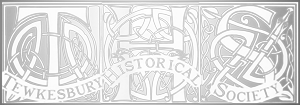
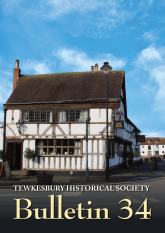
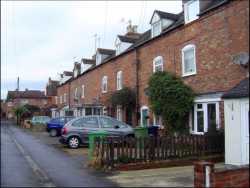
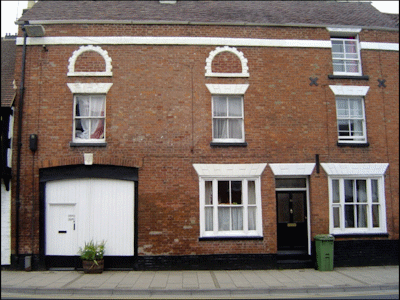
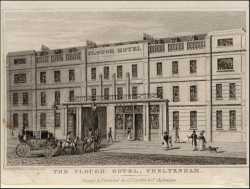
Comments